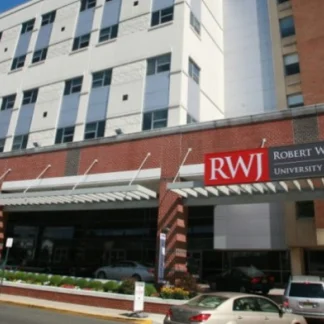Laszlo Center 4 Hope and Healing
Laszlo Center 4 Hope and Healing is a private rehab located in East Brunswick, N...
Robert Wood Johnson University Hospital – New Brunswick located in New Jersey, is a leading healthcare provider that offers mental health and behavioral health services. Committed to delivering compassionate and comprehensive care, they offer a wide range of treatment options and drug rehab programs designed to support individuals on their path to mental well being and recovery.
They provide an extensive range of treatment options and programs designed to address various mental health conditions and support individuals in their journey toward recovery and improved quality of life.
The facility offers inpatient mental health services for individuals requiring intensive and structured treatment in a hospital setting. With a multidisciplinary team of psychiatrists, therapists, and nurses, they provide comprehensive assessment, medication management, individual and group therapy, and a supportive environment to stabilize individuals in crisis and promote their well being.
The organization provides outpatient behavioral health programs that offer flexible and individualized care for individuals who can manage their mental health needs while living at home. These programs encompass a range of services, including psychiatric evaluations, medication management, therapy sessions, and psychoeducation groups, tailored to meet each individual’s unique needs.
The organization’s IOPs are designed for individuals who require structured treatment but do not need 24/7 care. IOPs typically involve several sessions per week, offering a comprehensive range of therapeutic services, including group therapy, individual counseling, psychiatric evaluations, and medication management, enabling individuals to continue their daily routines while receiving necessary support.
Contact us for more information: (732) 828-3000

Connect with Robert Wood Johnson University Hospital - New Brunswick by calling their admissions team directly.
(732) 828-3000 Website Get DirectionsCognitive Behavioral Therapy (CBT) is a therapy modality that focuses on the relationship between one's thoughts, feelings, and behaviors. It is used to establish and allow for healthy responses to thoughts and feelings (instead of unhealthy responses, like using drugs or alcohol). CBT has been proven effective for recovering addicts of all kinds, and is used to strengthen a patient's own self-awareness and ability to self-regulate. CBT allows individuals to monitor their own emotional state, become more adept at communicating with others, and manage stress without needing to engage in substance abuse.
Research clearly demonstrates that recovery is far more successful and sustainable when loved ones like family members participate in rehab and substance abuse treatment. Genetic factors may be at play when it comes to drug and alcohol addiction, as well as mental health issues. Family dynamics often play a critical role in addiction triggers, and if properly educated, family members can be a strong source of support when it comes to rehabilitation.
Group therapy is any therapeutic work that happens in a group (not one-on-one). There are a number of different group therapy modalities, including support groups, experiential therapy, psycho-education, and more. Group therapy involves treatment as well as processing interaction between group members.
In individual therapy, a patient meets one-on-one with a trained psychologist or counselor. Therapy is a pivotal part of effective substance abuse treatment, as it often covers root causes of addiction, including challenges faced by the patient in their social, family, and work/school life.
Research clearly demonstrates that recovery is far more successful and sustainable when loved ones like family members participate in rehab and substance abuse treatment. Genetic factors may be at play when it comes to drug and alcohol addiction, as well as mental health issues. Family dynamics often play a critical role in addiction triggers, and if properly educated, family members can be a strong source of support when it comes to rehabilitation.
Group therapy is any therapeutic work that happens in a group (not one-on-one). There are a number of different group therapy modalities, including support groups, experiential therapy, psycho-education, and more. Group therapy involves treatment as well as processing interaction between group members.
In individual therapy, a patient meets one-on-one with a trained psychologist or counselor. Therapy is a pivotal part of effective substance abuse treatment, as it often covers root causes of addiction, including challenges faced by the patient in their social, family, and work/school life.
Group therapy is any therapeutic work that happens in a group (not one-on-one). There are a number of different group therapy modalities, including support groups, experiential therapy, psycho-education, and more. Group therapy involves treatment as well as processing interaction between group members.
In individual therapy, a patient meets one-on-one with a trained psychologist or counselor. Therapy is a pivotal part of effective substance abuse treatment, as it often covers root causes of addiction, including challenges faced by the patient in their social, family, and work/school life.
In individual therapy, a patient meets one-on-one with a trained psychologist or counselor. Therapy is a pivotal part of effective substance abuse treatment, as it often covers root causes of addiction, including challenges faced by the patient in their social, family, and work/school life.
Laszlo Center 4 Hope and Healing is a private rehab located in East Brunswick, N...
Rutgers - Program for Addictions Consultation And Treatment offers outpatient tr...
New Hope - Outpatient is dedicated to the treatment of adults and adolescents af...
Damon House is a trusted residential treatment center in New Brunswick, NJ, spec...